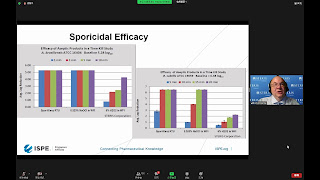STERIS WORKSHOP named “A Risk Assessment Approach to
Address Fungal Spore Contamination in a Cell and Gene Therapy Cleanroom” was
held by ISPE Singapore Affiliate on 18 Nov 2021. This workshop covered a
risk-based approach to an Aspergillus brasiliensis and Chaetomium contamination
in a Cell and Gene Therapy Cleanroom.
There were two speakers and they are Mr. Jim Polarine Jr. MA. (Senior
Technical Service Manager, STERIS Corporation) and Mr. Dan Klein (Senior
Technical Service Manager, STERIS Corporation).
In the beginning, Mr. Jim Polarine discussed the
contamination source including aging facility, materials spore, operator in
cleanroom, spill out or residual during process, touching utilities, and contaminated
equipment, etc.
Then Mr. Polarine briefed the contamination control
strategy that disinfectants are balancing efficacy, stability, compatiability,
safety, etc.
And then he introduced the process of cell and gene
therapy from “Thaw the blood” to isolate T-cell and natural killer (NK) cells, …
to fill bags or vials and freeze.
He also mentioned some common contamination control
throughout the process using H2O2, 70% IPA, etc.
Mr. Polarine demonstrated the efficacy of IPA and Sporicide
for B. subtilis under different surfaces like stainless stell, self-seal pouch
and polycarbonate.
The diagram showed different aseptic products had different
efficacy under different contact time.
Some quality tools were introduced such as Ishikawa
diagram and 5 Whys for problem analysis. One of case showed was Aspergillus in
cell and gene therapy facility.
He also demonstrated how to clean and disinfect the biosafety
cabinet (BSC). He also shared recent FDA 483 observation such as visible black
and brown stains on the ISO 5 Cleanroom celling tile, recalls due to mold
contamination, etc.
The second speaker Mr. Dan Klein then discussed the molds
common to cleanrooms and cold rooms. There are many different species with different
level or resistant.
Mr. Klein showed the fungal spore efficacy spectrum that
Chaetomium & Aspergillus spp were more resistant.
Then he used Aspergillus to explain different contaminations
such as high pressure impingement sprayers made holes in walls.
The highest risk for contamination is Cart Wheel during
pass-through clean and dirty area.
After that Mr. Klein showed the Aspergillus brasiliensis
spores using SEM that was difficult to destroy.
Chaetomium testing time kill was demonstrated. Different
method using Phenol A, Phenol B and 70% IPA on glass, stainless steel and
flooring were discussed.
Finally, Mr. Dan Klein shared the article on “Wet Contact
Time”.
Mr. Jim Polarine discussed the cleaning methods including
wax on wax off, overlapping unidirectional strokes, removal of residues,
particles and microbes, etc. Lastly, he
showed a casy study of construction event for triple clean - after 2x cleaning
with fungicidal and 1x cleaning with sporicide.
The critical area is cleaned.
At the end, he shared some industry reference.
Reference:
20211117:
Regenerative Medicine 101 Webinar - Information for Patients, Caregivers &
Advocates - https://qualityalchemist.blogspot.com/2021/11/regenerative-medicine-101-webinar.html
20161216:
HKSTP 2nd Hong Kong & Guangzhou International Conference on Stem Cell and
Regenerative Medicine - https://qualityalchemist.blogspot.com/2016/12/hkstp-2nd-hong-kong-guangzhou.html
20151220:
HKSTP Hong Kong & Guangzhou International Conference on Stem Cell and
Regenerative Medicine - https://qualityalchemist.blogspot.com/2015/12/hkstp-hong-kong-guangzhou-international.html
20140608:
HKU Public Lecture on Gene and Cancer & Stem Cells - https://qualityalchemist.blogspot.com/2014/06/hku-public-lecture-on-gene-and-cancer.html


















沒有留言:
發佈留言